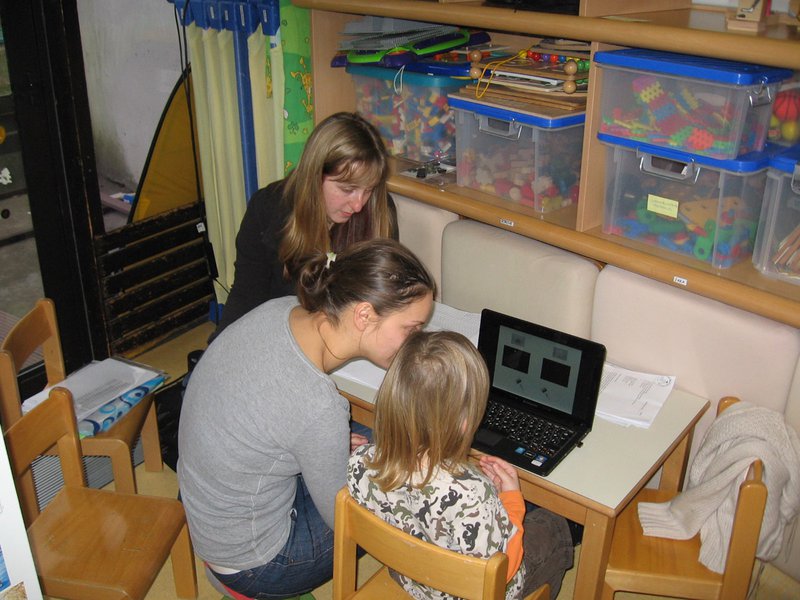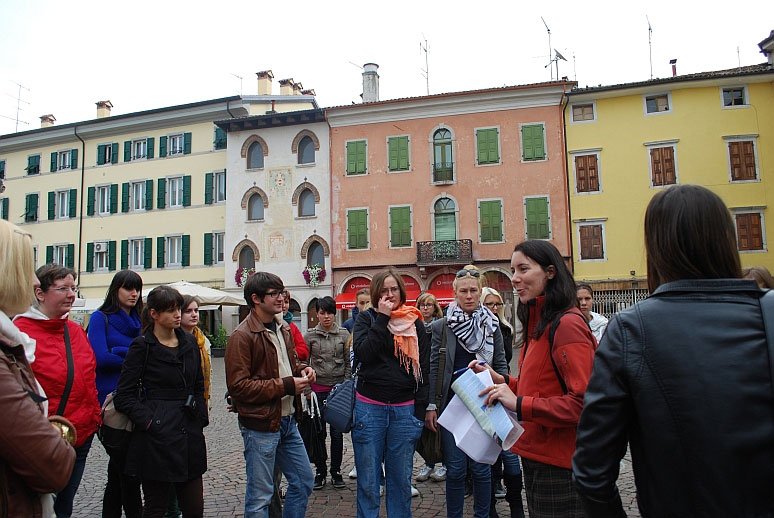Why choose the School of Humanities?
A lively and interesting range of authentic academic subjects.
A lively and interesting range of authentic academic subjects
Along with the obligatory courses, our school offers a wide range of elective courses, so we students have an opportunity to choose the fields in which we are highly interested.
A student’s view:
A person who is interested in the humanistic studies is almost unwillingy connected to the environment in which he lives. The School of Humanities in Nova Gorica is embedded in its environment, open to an international influence, which may help in an increase of the understanding of Slovenes who live in Italy and in other parts of the world. A close connection to the immediate environment may also mean that persons are able to understand more easily those who live away from their homeland, understand their wish to be connected to their homeland and native language. A lively and interesting range of academic subjects may facilitate this connection. Numerous elective courses provide an opportunity for students to choose, apart from the obligatory courses, the fields they are really interested in. The school, with its professors and academic subjects, provides all opportunities which ensure excellent study programmes. The school also aims to establish an open relationship between professors and students, an openness towards future, a dynamic approach to life, and an education which helps form critical thinking and active approach in the prospective intellectuals. This educational process is facilitated by the university’s numerous international connections which offer students an opportunity to do part of their study obligations at other universities in Europe.
Motivated professors
Our professors spend their time not only in teaching but also in doing research; they are excellent professionals in their fields of research and interest.
When it comes to the Slovene academic environment, the academic staff of the School of Humanities are known for their innovative introduction and development of new methodological approaches in the field of humanities. The approaches are related to both local and contextually wider phenomena. Our educational and research team is made up of mostly young yet acclaimed scientists; many of our professors have done part of their education abroad, where they continue to be involved in scientific and professional projects.
Professional and research work
Professional and research work during the academic studies.
Students’ experience:
It was the first time we had an opportunity to take part in a research of such an extensive, contemporary and interdisciplinary scope. The type of research has given new insights into the field of language acquisition and the related field of numbers acquisition. It opened up to us a glimpse into the work going on in language research centres and it offered us an opportunity to create connections with both local and international researchers and their work. By this we primarily mean an access to do research, preparation for field work (making contacts with directors of kindergardens and obtaining their consent), doing tests, data analyses, and analytical-interpretative part of the research.
We were very pleased to be introduced as co-authors in the Language as a source of numerical concepts research and in a contribution made at an international conference, related to our research. It also seems important to us that the paper Usvajanje matematičnega števila (Acquisition of Mathematical Numbers) has made us visible in the Slovene publication context.
This research has made us so enthusiastic about this particular field that in the future we would be happy to take part in a research related to language acquisition or language characteristics.
Vesna Plesničar and Tina Razboršek

Study exchanges
The University of Nova Gorica has links and cooperation with numerous international universities and institutions, so students have an opportunity to do part of their study obligations at other European universities.
Students’ experience in Prague
Greetings from Prague
Ahoj!
We are students of Slovene studies (School of Humanities, University of Nova Gorica), currently spendin our student life in a study exchange programme at the Faculty of Philosophy, Charles University, Prague. We will be studying Eastern European literature here for two semesters, taking a few exams in Slovene literature and writing our diploma thesis. At the same time, we have been studying the Czech language for some time now; our one month intensive course in Czech started this summer in Brno.
A student and cultural life in the city of Prague offer various opportunities, which we are more than happy to explore. We have attended a few seminars, we go to cinema, theatre, literary evenings, exhibitions, concerts. There have been a few interesting simposia in the field of our studies as well.
The best thing to do is to present our life in Prague with photos; if you need any other information, you may write to us via the blog, and we will try to answer your questions.
First of all, here is a photo of the Faculty of Philosophy main building. (photo)
An area of city buildings in Hostivař and a sunny afternoon in a nearby park, one of the biggest parks in Prague. (photos)
A few moments from the city centre. (photos)
The city of Prague before Christmas. (photos)
Two photos taken at the literary evening of Primož Čučnik and Gregora Podlogar, Slovene poets.
The evening has taken place in Montmartre coffee bar in the centre of Prague. (photos)
Kind regards from Ksenija and Petra from a snowy Prague.
Ongoing events
Excursions, workshops, encounters.
An excurcision: Among Slovenes in the Udine region
On Friday, 12 October 2012, the students of Slovene Studies and Cultural History (School of Humanities, University of Nova Gorica) set out on a professional excursion to Čedad and Špeter. Our guides were professors dr. Danila Zuljan Kumar and dr. Ana Toroš. The students of the study programme in Migration and intercultural relations joined us as well, guided by Veronika Piccinini, English lector, who took care of the simultaneous translation in English.
In the first cultural-historical part of our visit, we visited the Ivan Trinko Cultural Society in Čedad, where we were met by Lucia Trusgnach, editor of Trinko’s calendar. Ms Trusgnach presented to us the society’s activities and the valuable book publications issued under the auspicies of the society; some of the publications were presented to us as gifts. Ms Bruna Balloch, author of Mlada lipa, told us a story in a local dialect. A strong creative energy and efforts to preserve Slovene culture were felt in Špeter as well, where we visited The Institute for Slovene Culture in late afternoon hours. Ms Marina Cernetig, the Institute’s president, and Ms Živa Gruden, director of a bilingual school in Špeter, have talked about the model of bilingual education and cultural life in the region in which they live.
Deni Drnovšček, second year student, Slovene Studies programme

